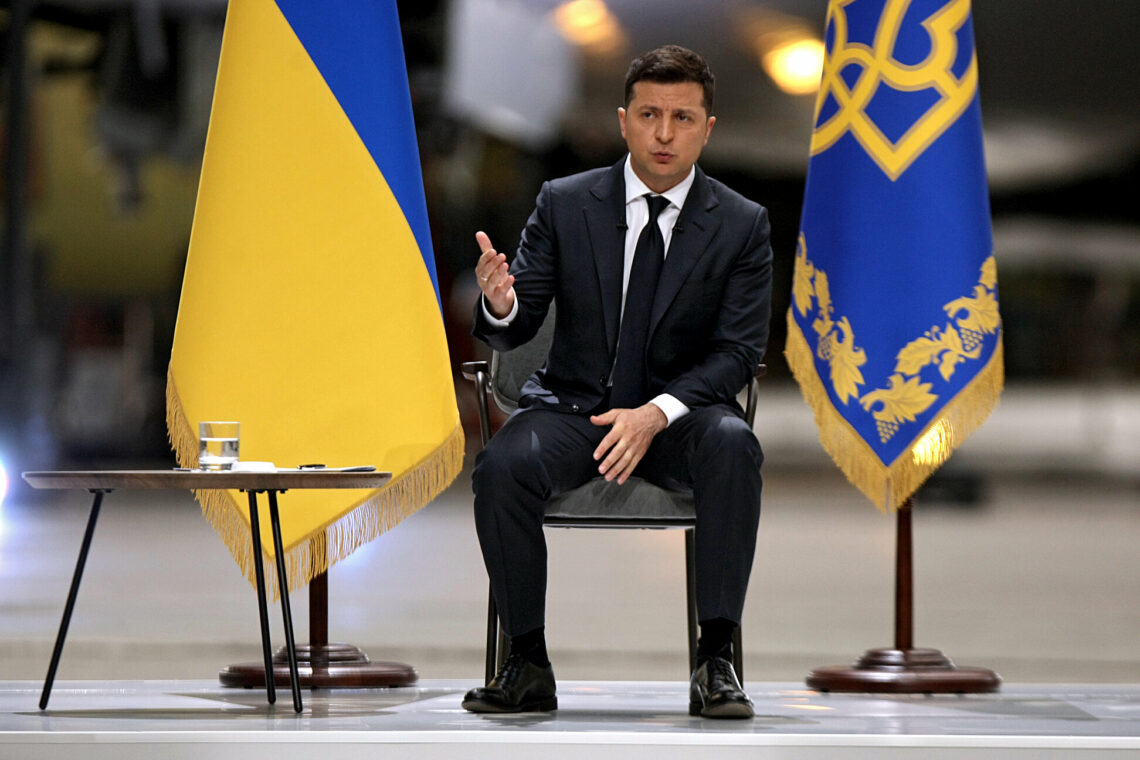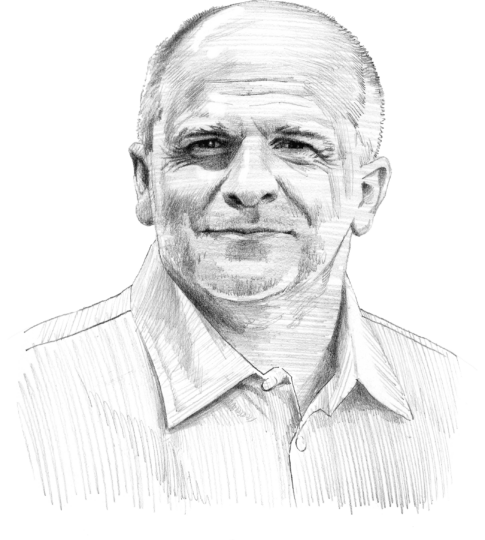Ukraine’s fraying political ties to the West
After nearly a decade of war and with no prospects of joining NATO and the EU, Ukraine is increasingly disillusioned with its partnership with the West. The influence of Russia in Ukraine is growing, promoted by media propaganda and pro-Russian opposition politics.

In a nutshell
- President Zelenskiy has failed to overhaul the country
- Pro-European voices are growing fainter
- Without support, Ukraine could turn away from the West
President Volodymyr Zelenskiy came to power in 2019, riding a wave of public dissatisfaction with the political order established after the upheaval of 2013-2014. The change appeared profound.
Mr. Zelenskiy managed to overhaul the top tier of the Ukrainian government, and a relatively large group of new politicians entered the scene. As a former comedian, he was an outsider himself. Many hoped he would end the war in Donbas, which claimed thousands of lives.
The Ukrainian political scene
Ukraine has been at war for eight years. Society is traumatized by constant reports of violence, while Donbas is only partially stabilized and remains under the control of Russian-backed separatists. Another part of Ukrainian territory, Crimea, is occupied by Russia. The new president has not put an end to the conflict, nor has he neutralized the oligarchs’ influence on the government. However, he is supported by an effective team capable of presenting his presidency in a favorable light. Despite a drop in popularity, he could well be reelected.
Like most others before him, Mr. Zelenskiy will likely focus on centralizing power, weakening the position of the prime minister and taking control of key ministries. On July 15, Arsen Avakov – one of the most influential Ukrainian politicians, who had supported Mr. Zelenskiy at a critical moment in the election campaign – was dismissed from his post as interior minister. His departure means that the president will now control the state power ministries and special services (with the exception of the National Anti-Corruption Bureau of Ukraine).
If parliamentary elections were held now, former President Petro Poroshenko (2014-2019) would probably come second, but with a large number of votes. His party has strong ties to the European Christian Democrats, which are still among the most influential on the continent. He is also active on the international scene, making many contacts during his time as president and as foreign minister (2009-2010). Furthermore, in the tense period following the Euromaidan events, he was one of the key figures in international negotiations. Important politicians in the West return his phone calls.
President Zelenskiy sees Mr. Medvedchuk as a serious competitor.
All of this allows him to compete with President Zelenskiy on the foreign front. And at home, Mr. Poroshenko relentlessly travels around the country to meet voters, especially in the western and central parts of Ukraine. This is most likely part of a plan to strengthen the position of his party among right-wing nationalist voters. The former president is aware that, with Russia taking over the eastern and southern regions of the country, the electoral battle will play out in the west.
Mr. Poroshenko’s main competitors for the second spot in the Ukrainian political scene belong to an opposition party with a pro-Russian program, the Opposition Platform – For Life. Yuri Boyko, an experienced politician, regularly ranks second or third in popularity rankings. Viktor Medvedchuk is also a veteran of Ukrainian politics. Due to his good relations with Russian President Vladimir Putin and his entourage, he has often acted as an intermediary in Ukrainian-Russian relations, as well as during the Poroshenko presidency.
President Zelenskiy sees Mr. Medvedchuk as a serious competitor. In February 2021, he made three moves against him. First, he blocked the broadcasting of three TV channels owned by him. Secondly, he approved a decision of the National Security and Defense Council that introduced sanctions against him, among other people and institutions. Third, the president pressured the government to take control of the PrykarpatZachidtrans company, through which Mr. Medvedchuk and his allies control the pipeline from Russia to Ukraine.
Threats to stability
The events following the rigged elections in Belarus last August had a profound impact on the situation in Ukraine. They shed light on the Kremlin’s efforts to rebuild the old Russian Empire, with Belarus and Ukraine brought into the fold, and showed President Putin’s readiness to undertake nonstandard activities on a large scale. In addition to the hybrid war in Ukraine, the Russian authorities supported extreme measures like the hijacking of an airplane in Belarusian airspace.
Kiev is greatly disappointed by Belarusian President Alexander Lukashenko’s hostile policy toward Ukraine. But Minsk’s stance is unsurprising. The Ukrainian government has aligned itself with the West in the dispute over the recent elections in Belarus.
Ukrainians are hoping that the turmoil in Belarus will translate into greater support from the European Union, NATO and the United States. It is obvious, after all, that a potential collapse of Ukraine’s pro-Western course would lead Kiev to turn to Russia. This would effectively undo most of the regional political changes that followed the collapse of the Soviet Union 30 years ago.
Pro-Western leadership in Ukraine is one of the keys to stability in Central and Eastern Europe. A democratically-elected, pro-Russian government in Kiev would lead to the collapse of the EU’s eastern policy. The Eastern Partnership program would be discredited, and U.S. interests in the region would be threatened. It is therefore all the more surprising that Ukraine’s security is not treated by decision makers in the West as the main issue when it comes to security relations with Russia.
Many Ukrainians believe the war in Donbas is being waged on behalf of the West.
Ukrainian society has for the most part maintained its pro-Western attitude – this is the stance of Mr. Poroshenko’s supporters, and most of Mr. Zelenskiy’s. But, while pro-European slogans were frequently heard in previous electoral campaigns, this time around they have grown scarce.
Brussels continues to refuse extending an invitation of EU membership to Ukraine. The prospect of relations with NATO are not promising either; despite Kiev’s extensive military and logistic efforts to cooperate with the organization, there is still no plan for Ukraine to join. Such a course of action would not find support in Washington today.
Ukrainians are also critical of Germany and the U.S. for signing the Nord Stream II agreement. This discontent could prove beneficial to the Kremlin. Independent Ukraine has experienced energy blackmail from Russia several times in the last three decades, and there is no doubt that the new pipeline will be used as a means of exerting pressure on the country. Many have commented that the West’s reassurances in this regard are reminiscent of the 1994 Budapest Memorandum. Intended to guarantee the territorial integrity of Ukraine in exchange for denuclearization, the agreement is now widely seen as a broken promise.
Many Ukrainians believe the war in Donbas is being waged on behalf of the West, and are increasingly disillusioned with unfulfilled hopes of closer ties.
The EU could boost pro-Western sentiment by liberalizing trade and movement with Ukraine, Georgia and Moldova through the Eastern Partnership. However, there is little appetite in Brussels for such reforms. Poland, the main advocate of the partnership, at the moment has little clout in the EU.
Scenarios
At no point during the last three decades has Ukraine’s situation in the context of Russian policy been so dramatic, nor has the strategic importance of this issue been so relevant to the West. This makes it all the more difficult to understand why Western powers continue to deny Ukraine’s right to join their political circles.
The most likely scenario is that the current political stagnation under President Zelenskiy will persist. This state of affairs will resemble the second term of President Leonid Kuchma (1994-2005): a relative equilibrium between influential oligarchs who weaken the country’s pro-Western course.
Despite the president’s assertive gestures toward Russia at the beginning of 2021, Russian influence in Ukraine will become stronger. Disappointment with the West will also grow, exacerbated by problems with Western investments in Ukraine. Corruption could proliferate as a result. Such a scenario can only be averted by the emergence of a new, pro-reform political force on the Ukrainian political scene in tandem with more EU and U.S. involvement.
In Kiev, reforms and a continuing alignment with the West are only possible if there are new initiatives involving Ukraine. This could be closer ties to the EU for Eastern Partnership countries or the prospect of NATO membership. A new Poroshenko government or an alliance between Messrs. Zelenskiy and Poroshenko would contribute to this outcome, but this would be possible only after the elections. Although today it is difficult to imagine close cooperation between the former president and the current president, it could become more likely in the future. Without former President Poroshenko, it will be difficult to create a new, credible pro-European program for Ukraine.
Ukraine could slowly grow closer to Moscow as a result of Russian influence in the media and the activities of the Opposition Platform camp. Part of Mr. Zelenskiy’s support base is also pro-Russian. If this process continues, it could, in turn, weaken the pro-Western orientation of Georgia as well, and perhaps also of Moldova (where a government aligned with the West has recently come to power). A change in Ukraine’s geopolitical orientation would have wide-ranging effects. It would require significantly more defense spending from Eastern European NATO members, and it would harm U.S. and EU interests.






